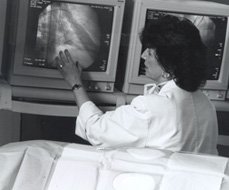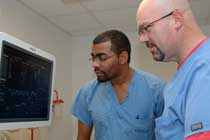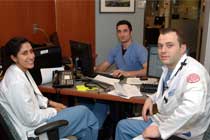CVC News
BMC raises the bar for innovative cath lab procedures
A recognized leader in ground-breaking cardiac care, BMC continues to be on the cutting edge of innovation with new procedures being utilized in its cardiac catheterization laboratory.
BMC interventional cardiologists are now performing cardiac catheterizations using the radial artery as an access site. Unlike the more traditional approach that utilizes percutaneous access of the femoral artery, the transradial method may reduce the risk of major bleeding complications and potentially shorten the hospital stay.
 In addition, "patients appreciate the fact that they do not have to lie flat on their backs for four to six hours following a procedure," said Zoran Nedeljkovic, MD, co-director of the Interventional Cardiology Fellowship Program and assistant professor of medicine at BUSM.
In addition, "patients appreciate the fact that they do not have to lie flat on their backs for four to six hours following a procedure," said Zoran Nedeljkovic, MD, co-director of the Interventional Cardiology Fellowship Program and assistant professor of medicine at BUSM.
Transradial catheterization has fewer potential complications than the femoral approach and can be used in patients who are not ideal candidates for transfemoral catheterization. "A careful assessment of circulation to the hand is needed prior to making a decision on which procedure is the safest way to proceed," added Dr. Nedeljkovic.
Cath lab interventional cardiologists recently used transradial catheterization during the first implantation of a temporary left ventricular assist device known as Impella 2.5, manufactured by Abiomed.
 "The Impella 2.5 can be used to facilitate high-risk angioplasty in debilitated patients because it increases cardiac output while a procedure is being performed, said David Litvak, interventional cardiologist at BMC." "During the first Impella implantation performed at BMC, the device was inserted across the patient's aortic valve via his groin and the angioplasty performed via his left radial artery."
"The Impella 2.5 can be used to facilitate high-risk angioplasty in debilitated patients because it increases cardiac output while a procedure is being performed, said David Litvak, interventional cardiologist at BMC." "During the first Impella implantation performed at BMC, the device was inserted across the patient's aortic valve via his groin and the angioplasty performed via his left radial artery."
A stent was inserted into the patient's mid-left anterior descending coronary artery. The Impella 2.5 was withdrawn at the end of the procedure, and the patient was discharged a few days later.
"BMC is a center for a national trial of the Impella device," said Alice Jacobs, MD, principal investigator for the trial and director of the Cardiac Catheterization Laboratory and Interventional Cardiology and professor of medicine at BUSM. "The Impella trial and transradial catheterization indicate the direction that interventional cardiology is taking. We are adapting our procedures to accommodate high-risk patients who may be poor candidates for a surgical procedure performed under general anesthesia."
For more information, or to schedule a patient call the cardiac catheterization laboratory at (617) 638-8702.

About Us






